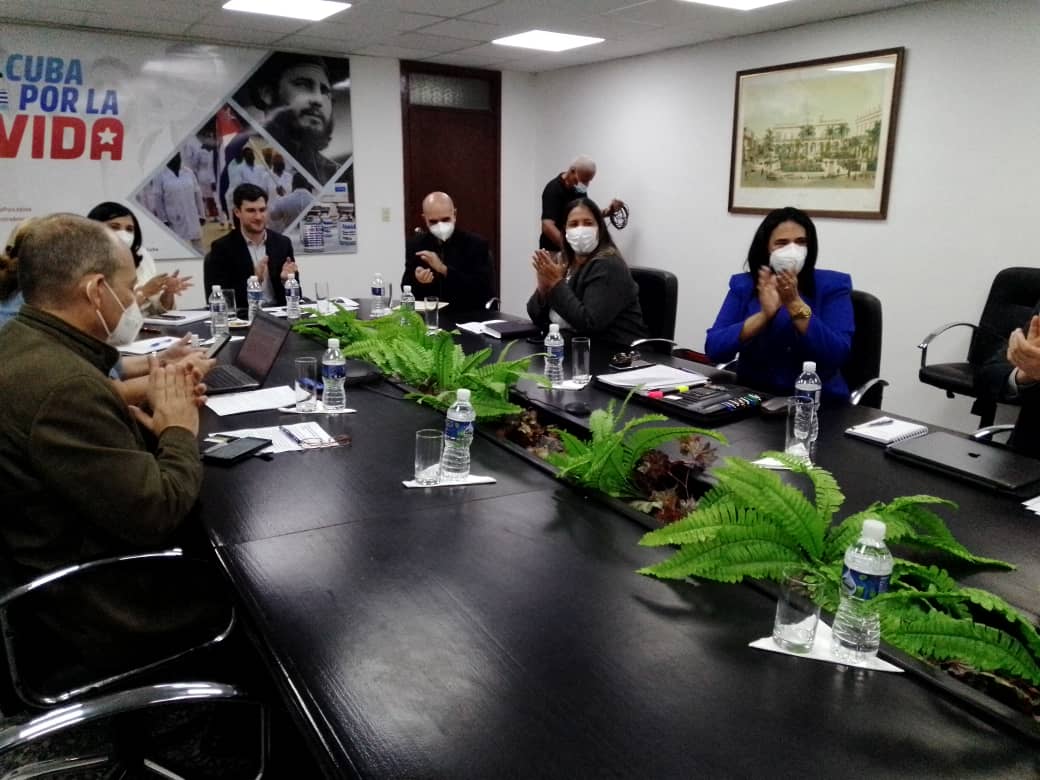Speaking at the virtual event For the Internationalism of Vaccines with Cuba, convened by the Progressive International organization, Deputy Minister of Public Health Regla Angulo Pardo stressed that all impediments must be removed globally so that vaccines reach all countries.
She confirmed that the United States blockade against Cuba, imposed for more than 60 years and intensified during the administration of President Donald Trump and the Covid-19 pandemic, constitutes the main obstacle to the production and export of Cuban vaccines.
The virtual meeting had a Q&A session with the participation of the director of Innovation and Industry of BioCubaFarma, Rolando Perez; the director of Science and Technological Innovation at the Cuban Ministry of Public Health, Ileana Morales; the director of Research at the Finlay Vaccines Institute (IFV), Dagmar Garcia, and the director of Biomedical Research of the Center for Genetic Engineering and Biotechnology, Gerardo Guillen.
When answering a question about the impact that Cuban vaccines still do not have the certification of the World Health Organization (WHO), Perez explained that this has not been either a restrain or an obstacle.
“With the countries we are working with, like Nicaragua, Venezuela, Iran, Mexico, Saint Vincent and the Grenadines, Syria and Vietnam, this does not represent any difficulty,” she said.
She added that perhaps it has been an impediment for Cuban vaccines to be in the WHO’s Covax fund, but she stressed that the prices with which Cuba works are in solidarity and are in the order of what that mechanism would be.
In this regard, Dr. Dagmar Garcia noted that not having that guarantee yet does represent a wall for Cuban citizens to travel freely to other countries in the world, where they (the Cuban vaccines) are not recognized.
“Those vaccinated here, with our products with proven effectiveness, are limited in living or moving freely in the United States or Europe, despite the fact that they are immunized and have powerful levels of antibodies against the disease,” she stated.
For his part, Perez explained that the dossier for the approval of the Abdala vaccine, developed by the CIGB, is in the final review phase and in the next few days the dossier for the other products will be submitted to the WHO.
Regarding the possibility of technology transfer, Dagmar Garcia recalled that the Cuban biotechnology industry has extensive experience in South-South cooperation, an example of which is the export of vaccines against meningitis, especially to Africa; and technology has also been transferred to the Pasteur Institute in Iran in terms of the Soberana 02 Covid-19 vaccine.
Dr. Morales noted that Cuba is in a position to provide advice on the model of the mass vaccination strategy, preparation, organization and development of this process.
Regarding the efficacy of Cuba’s homegrown vaccines against the Omicron variant of the SARS-CoV-2 coronavirus, she explained that Cuba maintains a broad portfolio of studies on the impact of vaccination on pregnant women or other groups, and continuous research is being carried out on the subject.
“We can ensure that high levels of antibodies are detected in those vaccinated with both the Soberna, by the IFV, and Abdala vaccines. In addition, we went ahead with the fourth booster dose in the country before the first case of Omicron was detected,” she added.
That forecast, Perez said, made it possible for the country’s pandemic peak with the Omicron variant to have a lower lethality compared to that of the Delta variant and with respect to the percentages at the regional and global levels.
In the closing remarks of the event, the general coordinator of the Progressive International, David Adler, expressed his gratitude to Cuba for the opportunity to make its progress known to the world, and reiterated the objective of his institution to promote and support immunization in the world.
jg/mem/cdg









